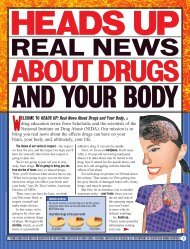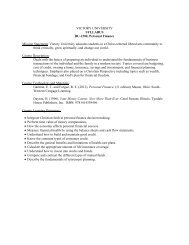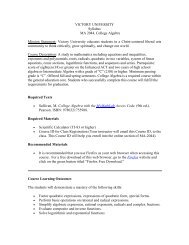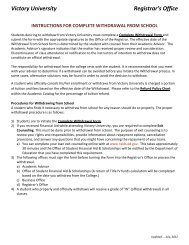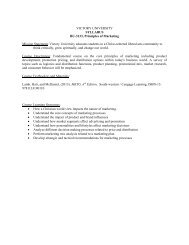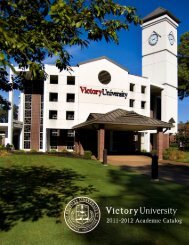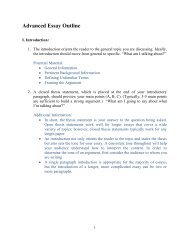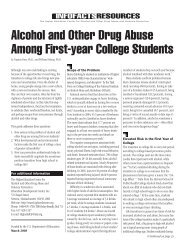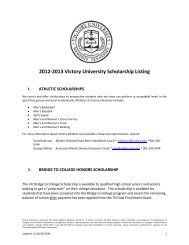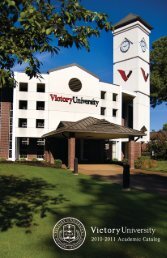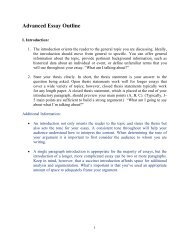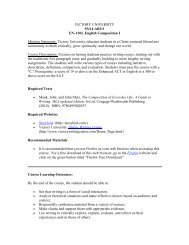- Page 2 and 3:
ACADEMIC CATALOG 2012-2013 Effectiv
- Page 4 and 5:
NOTICE The Academic Catalog describ
- Page 6 and 7:
Table of Contents ACCREDITATIONS ..
- Page 8 and 9:
1 | INTRODUCTION PRESIDENT’S MESS
- Page 10 and 11:
program in Psychology was added in
- Page 12 and 13:
LOCATION The Flats at Cotton Counci
- Page 14 and 15:
3 | ADMISSION UNDERGRADUATE ADMISSI
- Page 16 and 17:
While Victory University assists st
- Page 18 and 19:
expected to complete the Accuplacer
- Page 20 and 21:
documents. Additionally, an applica
- Page 22 and 23:
Admissions. 2. Final Official Trans
- Page 24 and 25:
e received by mail directly from th
- Page 26 and 27:
Transient Student Requirements Stud
- Page 28 and 29:
academic performance (I.e. attendin
- Page 30 and 31:
ACT English Mathematics ACT English
- Page 32 and 33:
5 | STUDENT DEVELOPMENT POLICIES Vi
- Page 34 and 35:
• Discipline ‐ Students can exp
- Page 36 and 37:
‣ Unauthorized Use of Property or
- Page 38 and 39:
include exaggerated or excessive te
- Page 40 and 41:
AREAS OF PERSONAL DISCRETION It is
- Page 42 and 43:
CAMPUS JUDICIAL SYSTEM AND DISCIPLI
- Page 44 and 45:
4.3 In the event that the Universit
- Page 46 and 47:
5.5 Reprimand is an official writte
- Page 48 and 49:
6 | STUDENT SUCCESS CENTER The Stud
- Page 50 and 51:
elate to academic performance. Cond
- Page 52 and 53:
• Computer users are expected to
- Page 54 and 55:
Breach of Security This is any atte
- Page 56 and 57:
8 | VETERANS SERVICES LOCATIONS & H
- Page 58 and 59:
PRIOR LEARNING ASSESSMENT (PLA) Pri
- Page 60 and 61:
those official transcripts will be
- Page 62 and 63:
ACADEMIC PROGRESS & CONTINUATION Al
- Page 64 and 65:
10 | FINANCIAL INFORMATION TUITION
- Page 66 and 67:
**Students who are required to pay
- Page 68 and 69: E. This policy may be modified by t
- Page 70 and 71: The elimination of subsidized loan
- Page 72 and 73: • Payments can be deferred for up
- Page 74 and 75: For Unsubsidized Federal Direct Loa
- Page 76 and 77: A student’s withdrawal date is de
- Page 78 and 79: total Title IV funds used. For inst
- Page 80 and 81: and fees at the beginning of the se
- Page 82 and 83: Students receiving scholarship awar
- Page 84 and 85: scholarship has an internal procedu
- Page 86 and 87: Tennessee Dual Enrollment Grant Pro
- Page 88 and 89: Accredited Institution, Victory is
- Page 90 and 91: INTERNATIONAL STUDENT SCHOLARSHIP (
- Page 92 and 93: program is also designed to meet st
- Page 94 and 95: Students who have graduated from on
- Page 96 and 97: 2. The student attends Victory, pay
- Page 98 and 99: TRANSFER STUDENT A transfer student
- Page 100 and 101: Point Average (GPA). No student wil
- Page 102 and 103: 1. Personal statement (no longer th
- Page 104 and 105: esponsible for the independent cour
- Page 106 and 107: completed by the student, and is do
- Page 108 and 109: experience. Credit will be granted
- Page 110 and 111: ACCESSING GRADES Official grade rep
- Page 112 and 113: Student Services supervisor……
- Page 114 and 115: ) The Chair of the ad hoc committee
- Page 116 and 117: for the course. Absences due to req
- Page 120 and 121: • Unauthorized access involves ga
- Page 122 and 123: RELEASE OF STUDENT INFORMATION The
- Page 124 and 125: Students using transient credit, CL
- Page 126 and 127: INSTITUTIONAL PROGRAM SEQUENCE REQU
- Page 128 and 129: C3. Demonstrate the ability to thin
- Page 130 and 131: departments. At the option of the a
- Page 132 and 133: General Education Degree Map For Fi
- Page 134 and 135: MAJOR PROGRAMS OF STUDY Associate o
- Page 136 and 137: Allied Courses MA-2133 Applied Stat
- Page 138 and 139: • Compete successfully for employ
- Page 140 and 141: Major Requirements EN-3003 History
- Page 142 and 143: General Electives TOTAL 120 SEMESTE
- Page 144 and 145: MINOR PROGRAMS IN ARTS AND SCIENCES
- Page 146 and 147: MINOR IN CRIMINAL JUSTICE TOTAL: 18
- Page 148 and 149: MINOR IN HISTORY TOTAL: 15 SEMESTER
- Page 150 and 151: MINOR IN MILITARY HISTORY TOTAL: 15
- Page 152 and 153: BACHELOR OF SCIENCE IN PSYCHOLOGY D
- Page 154 and 155: MINOR IN SCHOOL PSYCHOLOGY TOTAL: 1
- Page 156 and 157: BT-2130 Bible Interpretation 3 seme
- Page 158 and 159: CERTIFICATE IN CHRISTIAN MINISTRY C
- Page 160 and 161: MINOR IN CHRISTIAN MINISTRY TOTAL:
- Page 162 and 163: BACHELOR OF SCIENCE IN BUSINESS ADM
- Page 164 and 165: BACHELOR OF SCIENCE IN ORGANIZATION
- Page 166 and 167: courtroom in which lawyers must thi
- Page 168 and 169:
MINOR IN LOGISTICS (Choose four of
- Page 170 and 171:
• Initiate and maintain an ongoin
- Page 172 and 173:
The Victory University Teacher Educ
- Page 174 and 175:
information. 6. Provide speech and/
- Page 176 and 177:
engaged in Student Teaching. To be
- Page 178 and 179:
GENERAL EDUCATION CORE REQUIREMENTS
- Page 180 and 181:
13 | COURSE DESCRIPTIONS BIOLOGY (B
- Page 182 and 183:
mapping, and processes of mutation.
- Page 184 and 185:
BT-2300 DYNAMICS OF CHRISTIAN MINIS
- Page 186 and 187:
Old and New Testaments. Women and g
- Page 188 and 189:
BU-2153 FINANCIAL ACCOUNTING (3 SEM
- Page 190 and 191:
BU-3315 CONSUMER BEHAVIOR (3 SEMEST
- Page 192 and 193:
BU-4213 CORPORATE FINANCE (3 SEMEST
- Page 194 and 195:
May be repeated for up to six (6) s
- Page 196 and 197:
ED-1023 INFORMATION TECHNOLOGY (3 S
- Page 198 and 199:
ED-3273 SPECIAL STUDENT POPULATIONS
- Page 200 and 201:
incorporating research into their w
- Page 202 and 203:
EN-3701 FICTION WORKSHOP (3 SEMESTE
- Page 204 and 205:
GENERAL SCIENCE (GS) GS-1103 BIOLOG
- Page 206 and 207:
HS-3310 THE AFRICAN AMERICAN EXPERI
- Page 208 and 209:
will be conducted through the lens
- Page 210 and 211:
HU-1410 ELEMENTARY GERMAN II (3 SEM
- Page 212 and 213:
imaging, composing and performing m
- Page 214 and 215:
LEARNING ENHANCEMENT (LE) LE-0111 C
- Page 216 and 217:
law of exponents, basic operations
- Page 218 and 219:
PE-2603 THEORIES OF COACHING (3 SEM
- Page 220 and 221:
An examination of the physical, int
- Page 222 and 223:
PS-4123 GROUP THERAPY* (3 SEMESTER
- Page 224 and 225:
SA-9999-ASC AUSTRALIA STUDIES CENTR
- Page 226 and 227:
SA-9999-SSO THE SCHOLARS SEMESTER I
- Page 228 and 229:
VU-2100 FAITH AND LEARNING (3 SEMES
- Page 230 and 231:
Student Cohort Admission Approximat
- Page 232 and 233:
earned a 2.75 to 2.99 GPA on the la
- Page 234 and 235:
and submit a recommendation to the
- Page 236 and 237:
graduation. The Master’s degree i
- Page 238 and 239:
Summary. Students who wish to apply
- Page 240 and 241:
GRADUATE ACADEMIC POLICIES AND INFO
- Page 242 and 243:
11. Understand all aspects of profe
- Page 244 and 245:
assessment are allowed to continue
- Page 246 and 247:
4) Evaluation and appraisal procedu
- Page 248 and 249:
COUN 511 Psychopathology and Relati
- Page 250 and 251:
FACULTY RESOURCES AND QUALIFICATION
- Page 252 and 253:
Subsidized Stafford Loans Under the
- Page 254 and 255:
$100,000,000 aggregate. Fees for th
- Page 256 and 257:
III. IV. E. Failure (F) and Failure
- Page 258 and 259:
Note: Students who fail to enroll a
- Page 260 and 261:
April 27 Classes end May Apr 29 - M
- Page 262 and 263:
Summer - T5 - Term … May 6 to Jun
- Page 264 and 265:
DUAL ENROLLMENT FALL 2012 (8 WEEK F
- Page 266 and 267:
DUAL ENROLLMENT SPRING 2013 (8 WEEK
- Page 268 and 269:
16 | PERSONNEL VICTORY UNIVERSITY P
- Page 270 and 271:
O. Shelley Kemp, B.S., M.S.A., Asso
- Page 272 and 273:
OPERATIONS AND ENTERPRISE SYSTEMS D
- Page 274 and 275:
Nancy Kerns, Ph.D. (2010), Assistan
- Page 276 and 277:
Jason Jenkins, M.Div. (2011), Adjun
- Page 278 and 279:
William Chaney, Ed.D. (1987), Profe
- Page 280 and 281:
Jason Hood, Ph.D. (2011), Adjunct I
- Page 282 and 283:
ASSOCIATE PROFESSOR Donna M. Bracki
- Page 284 and 285:
F Facilities ......................
- Page 286:
2012-2013 Victory University Academ



